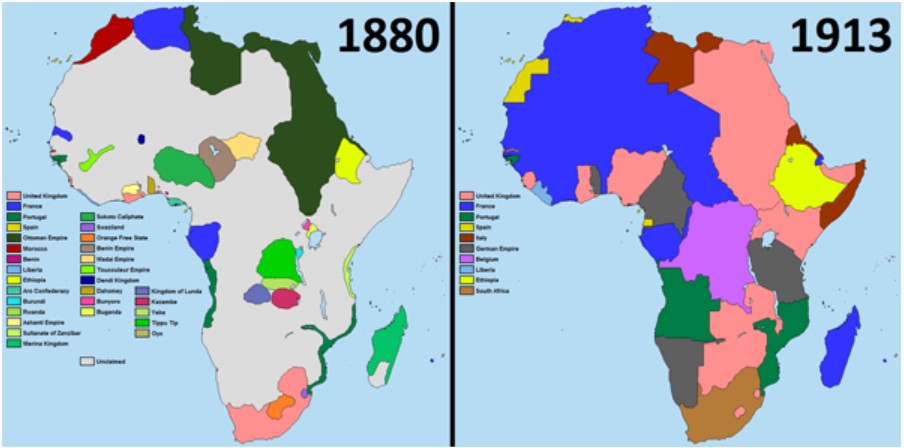By Lamac A. (2024)
The Origins: Berlin Conference and the Scramble for Africa
It all began in the mind of Otto von Bismarck, who, at the request of King Leopold II of Belgium, orchestrated a meeting that changed the fate of Africa forever. This meeting culminated in the infamous Berlin Conference (1884-1885), held in Berlin from November 15, 1884, to February 26, 1885. The conference, initiated and chaired by Bismarck, resulted in the General Act, with representatives from 14 European nations, though 7 countries left without any territorial claims in Africa.
For over 140 years, the decisions made at this conference have shaped African political and economic structures, leaving a legacy of oppression, inequality, and instability.
Unequal Division of African Territories
Although European colonialists benefited from Africa’s vast resources, some did not escape territorial inequalities and psychological torture due to unfair distribution.
The seven countries that failed to claim African territories were:
- Austria-Hungary
- Russia
- Denmark
- Netherlands
- Sweden-Norway
- The Ottoman Empire
- The United States
Meanwhile, the colonial powers that secured vast African territories included:
- France
- Germany
- Great Britain
- Italy
- Portugal
- Ireland
Notably, no African nations were invited to the Berlin Conference, and the arbitrary partitioning of the continent disregarded pre-existing cultural and linguistic borders, sowing the seeds for future conflicts.
Key Terms of the Berlin Conference
The General Act of the Berlin Conference outlined seven main provisions:
- The abolition of slavery
- Recognition of King Leopold’s claim over Congo
- Establishment of free trade in the Niger and Congo basins
- Freedom of navigation on the Congo and Niger Rivers
- Principle of “effective occupation” for territorial control
- Creation of “spheres of influence” to settle territorial disputes
- Mandatory notification to the other 13 nations before making new territorial claims
Berlin’s Founding
Berlin was founded by Elector Frederick II (1440-1471), who laid the foundation for what became the Berlin Stadtschloss (City Palace) on the Spreeinsel (Island in the Spree). Under Elector Johann Cicero (1486-1499), Berlin became the permanent residence of the Hohenzollern dynasty in Brandenburg.
How European and Black Colonialists Contributed to the Decline of African Indigenous States
The arbitrary borders created during the Berlin Conference led to numerous challenges, including:
- Political instability across African nations
- Tribal conflicts due to forced amalgamation of different ethnic groups
- Territorial disputes that persist today
- Power struggles that destabilize governance
- Social stagnation and limited national development
- Economic underdevelopment caused by foreign exploitation
- Obstruction of regional cooperation among African states
Case Study 1: The Acoli Chiefdom of Owolo/Paloga
In the late 19th and early 20th centuries, the small chiefdom of Owolo/Paloga in Northern Uganda was regarded as a formidable power despite its small size. They were recognized as skilled mercenaries, often fighting alongside Rwot Ogwok of Padibe.
Their strategic military formations earned them the adage “Tidi Kirame” (small but strong) and “MORO LAKOC” (referring to their red-ant-like battle formations). They played a critical role in repelling British colonial forces and negotiating treaties, but the collapse of Egyptian rule and increased European interference weakened their position.
The instability created by European interference allowed African rulers to engage in territorial expansion, leading to further internal conflicts and the eventual disintegration of indigenous power structures.
Case Study 2: The Rwenzururu Conflict (2016)
The legacy of colonial interference persists today, as seen in the November 26-27, 2016, attack on King Charles Wesley Mumbere of the Rwenzururu Kingdom.
Ugandan security forces, led by Lt. General Peter Elwelu, stormed the royal palace, citing allegations of attacks on police posts by royal guards. This conflict led to:
- The deaths of 87 royal guards and 16 police officers
- The arrest of King Charles Mumbere on charges of treason, murder, and terrorism
- A two-month imprisonment and subsequent house arrest in Kampala
This violent suppression significantly diminished the power of the Rwenzururu kingdom, demonstrating how colonial-era divisions still fuel modern conflicts.
Conclusion: The Lasting Impact of the Berlin Conference
The decisions made at the Berlin Conference reshaped Africa’s political landscape, disrupting indigenous governance and setting the stage for ongoing instability. Although direct European rule ended, its legacy continues through neo-colonialism, economic dependency, and internal conflicts among African states.
Image Source: https://en.wikipedia.org/wiki/Scramble_for_Africa#

